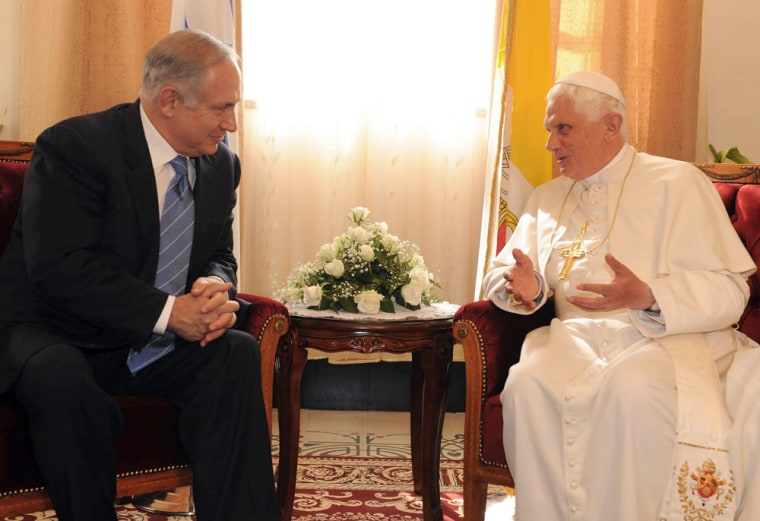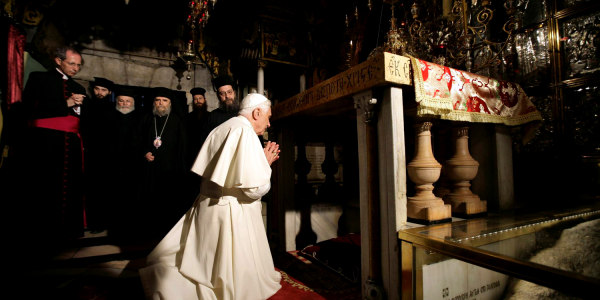Israeli Prime Minister Benjamin Netanyahu on Thursday appealed to Pope Benedict XVI "to make his voice heard" and use his moral authority to condemn the harsh anti-Israel rhetoric voiced by Iran's hard-line president.
The two men met privately for about 15 minutes, sharing their views about the Middle East. "I think we found in him an attentive ear," Netanyahu said.
Benedict has repeatedly called for the establishment of a Palestinian homeland during his current pilgrimage to the Holy Land. Netanyahu, leader of the hawkish Likud Party, has pointedly refused to endorse the concept of Palestinian independence — a cornerstone of international policy for the region.
The Vatican spokesman, the Rev. Federico Lombardi, said the talks "centered on how the peace process can be advanced."
'To make his voice heard'
But speaking to Israel TV afterward, Netanyahu made no mention of the Palestinians, saying he had appealed to the pontiff to speak out against Iranian President Mahmoud Ahmadinejad. The Iranian leader has repeatedly called for Israel's destruction and questioned whether the Holocaust in which 6 million Jews were killed by the Nazis, took place.
"I asked him, as a moral figure, to make his voice heard loud and continuously against the declarations coming from Iran of their intention to destroy Israel. I told him it cannot be that at the beginning of the 21st century there is a state which says it is going to destroy the Jewish state, there is no aggressive voice being heard condemning this," Netanyahu said.
Netanyahu said he was pleased with the pope's response. "He said that he condemns all instances of anti-Semitism and hate against the state of Israel — against humanity as a whole — but in this case against Israel."
Netanyahu has been trying to rally international pressure to halt Iran's nuclear program. Israel, the U.S. and other Western countries believe Iran is seeking nuclear weapons — a charge Tehran denies.
Afterward, Israeli and Vatican delegations met to discuss bilateral issues, including travel privileges for Arab Christian clergy, Lombardi told reporters.
Slideshow 47 photos
Pope’s pilgrimage
The Vatican has asked Israel to allow 500 priests from Arab countries to receive visas to enter Israel at will. Interior Minister Eli Yishai refused the request on security grounds, a spokesman said. But Netanyahu said he would reconsider the request.
The men met in Nazareth, the town of Jesus' boyhood, on the fourth day of the pope's Holy Land pilgrimage meant to promote peace and unity in the Middle East.
Throughout the trip, however, Benedict has been confronted with the region's most sensitive issues, including the legacy of the Holocaust, the Palestinian plight under Israeli occupation and fragile interfaith ties.
In an open-air mass earlier Thursday, Benedict greeted tens of thousands of adoring followers with a message of reconciliation, urging Christians and Muslims to overcome recent strife and "reject the destructive power of hatred and prejudice."
Lombardi, the Vatican spokesman, said earlier the pope was "very happy" with the outcome of the trip and that "all the important meetings were very positive." He said the main goal was "peace, peace, peace," adding that he felt the pope had listened to all sides, acting like a "bridge" between the various positions.
Country's largest Arab city
The choice of Nazareth — home to many key sites in Christianity — as the venue for the largest Mass the pope has celebrated during his visit was at least an indirect reflection of the interfaith strains he has tried to ease.
Nazareth, located in northern Israel's Galilee region, is the country's largest Arab city. Roughly two-thirds of its 65,000 people are Muslims and one-third are Christians. While the two communities tend to get along, they also have come into sporadic conflict.
Earlier this decade, Muslim activists outraged Christians when they built an unauthorized mosque next to the Basilica of the Annunciation, where Christians believe the Angel Gabriel foretold the birth of Jesus to Mary. Israel later tore down the mosque. Muslim activists also have periodically marched through the city in shows of strength meant to intimidate Christians.
In his homily, Benedict spoke of the tensions that have harmed interfaith relations.
"I urge people of goodwill in both communities to repair the damage that has been done, and in fidelity to our common belief in one God, the Father of the human family, to work to build bridges and find the way to a peaceful coexistence," he said. "Let everyone reject the destructive power of hatred and prejudice, which kills men's souls before it kills their bodies."
During a weeklong trip that included a stop in neighboring Jordan, the pope has also tried to draw attention to the dwindling number of Christians in the Middle East.
Members of the region's once large and prosperous Christian communities are increasingly leaving conflict-ridden areas including Iraq and the Palestinian territories to seek better lives in the West.
'Moral and spiritual support"
On Thursday, the archbishop of Galilee for the Greek Melkite Church, Elias Chacour, welcomed the pope with a plea for his prayers and "moral and spiritual support" to stem the exodus of Christians from the Holy Land.
He said the flight of Christians "fills me with pain" and that the future is not encouraging.
Thursday's Mass was celebrated on Mount Precipice, where Christian tradition says a mob tried to throw Jesus off a cliff. Later in the day, the pope headed to Basilica of the Annunciation to worship and for talks with local religious leaders.
Addressing a crowd of faithful and clergy after leading an evening prayer at the church, Benedict returned to the plight of the shrinking number of Christians left in the Holy Land.
"Like Mary, you have a part to play in God's plan for salvation, by bringing Christ forth into the world, by bearing witness to him and spreading his message of peace and unity," he said. "For this, it is essential that you should be united among yourselves."
Benedict is to return to the Vatican on Friday.
According to tradition, Jesus traveled through the Galilee with his disciples preaching and performing miracles in the final years of his life.

